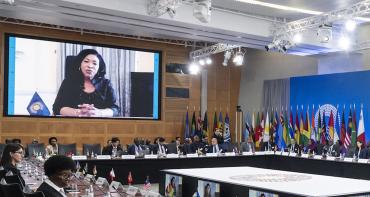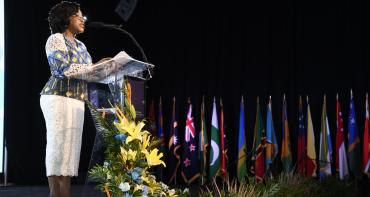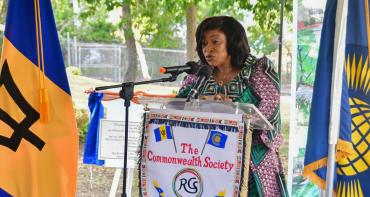Secretary-General Patricia Scotland has reaffirmed the Commonwealth’s support to countries seeking to promote humanitarian law.

Secretary-General Patricia Scotland has reaffirmed the Commonwealth’s support to countries seeking to promote humanitarian law, for example by ratifying the international Arms Trade Treaty, which regulates the trade in conventional weapons.
“It is encouraging that all our Caribbean member states have ratified the Arms Trade Treaty and it would be inspiring to see all regions follow suit,” she said at a seminar at the Commonwealth’s headquarters, organised in partnership with the British Red Cross.
Secretary-General Scotland was joined by High Commissioners and representatives from the humanitarian sector at the event to share best practices and review the latest developments in international humanitarian law – the law governing the conduct of parties in armed conflict.
"We are too much in silos. We need to compete against problem & not each other" @PScotlandCSG on #IHL implementation pic.twitter.com/0vjHapw0U8
— The Commonwealth (@commonwealthsec) June 13, 2016
Commonwealth governments at their Heads of Government Meeting in Malta in November 2015 collectively encouraged countries to ratify the Arms Trade Treaty, acknowledging that trade in illicit weapons leads to conflict and instability and stifles development. Out of 53 Commonwealth countries, 25 have ratified the treaty and 15 are signatories.
The Secretary-General stressed the role the Commonwealth can play in developing model laws that “everyone can use” to implement treaties that protect against violations of international humanitarian law.
“Our collective stance on the Arms Trade Treaty is firmly rooted in our Commonwealth Charter,” she affirmed.
The Secretary-General also underscored her plans to establish an Office of Civil and Criminal Justice Reform, which will, among other functions, support member countries to uphold obligations under international law.
In a detailed analysis of the Arms Trade Treaty, Julie Tenenbaum, a legal adviser at the International Committee of the Red Cross, highlighted Article 6 and 7 on the transfer and trade of arms as particularly important to prevent human rights and IHL violations. “It is very key to have international cooperation on this,” she stressed. “The ICRC was very strong in developing the treaty and is happy to help with its implementation.”
#SexualViolence as #InternationalCrimes - criminalisation of an act is key to preventing that act happening, says Tenenbaum @ICRC #IHL
— The Commonwealth (@commonwealthsec) June 13, 2016
From the perspective of the Caribbean, Giselle Martin, a legal adviser from the Caribbean Community (CARICOM), explained that the most immediate threat to the region is transnational crime, in which small arms play a big part, she said. Ms Martin stressed that border control issues are critical to ensure arms are not shipped or imported without appropriate licences. She pointed to strategic partnerships as essential to implementing the Arms Trade Treaty and said the region “had been benefiting from Commonwealth assistance” in this area.
Underscoring the importance of strengthening international cooperation to the treaty, David Concar, UK Commonwealth Envoy at the United Kingdom’s Foreign and Commonwealth Office commented: “It is an incredibly important time for the world with respect to multilateral efforts.”
Nazhat Shameem says gender awareness training needed for #naturaldisaster relief staff & guarding dignity and privacy of #GBV victims #IHL
— The Commonwealth (@commonwealthsec) June 13, 2016
The afternoon session, chaired by Commonwealth Deputy Secretary-General Josephine Ojiambo, focussed on addressing sexual violence in armed conflict and natural disasters.
Nazhat Shameem Khan, Fiji’s Permanent Representative to the United Nations in Geneva, spoke about the stigma involved in sexual violence cases and said that in incidents where crimes go unreported, survivors are denied access to medical treatment.
Ambassador Khan attributed the “silence” in such cases to “patriarchal structures” and authorities failing to act and protect women’s rights. “Sexual violence is pervasive in armed conflict. A lot can be done to implement existing laws and enhance efforts… criminalisation of an act is key to preventing that act from happening,” she stated.
In natural disasters, Ambassador Khan explained, it is even harder to report crimes involving sexual violence because access to institutions is disrupted and the usual safeguards are destroyed or undermined, which exacerbates vulnerabilities. Gender awareness training for disaster relief personnel, provision of sexual violence toolkits and access to health services must be made available, she said. “Good progressive laws are of no assistance to women unless they know of them.”
The one-day seminar on 13 June 2016 included sessions on strengthening legal frameworks for disaster response and risk reduction and protecting cultural property. It is part of an ongoing partnership between the Commonwealth Secretariat and the British Red Cross to strengthen national international humanitarian law committees and Red Cross and Red Crescent societies, which play key roles in advising governments on policies and their obligations under international treaties.



